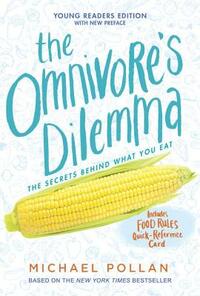You need to sign in or sign up before continuing.
Take a photo of a barcode or cover
challenging
dark
informative
inspiring
reflective
medium-paced
"Pollan follows four meals from the farm to the plate (or the greasy wrapper inside a car going sixty mph, in the case of the McDonald's burger), and in doing so, introduces the terms \monoculture,\"" \""industrial organic,\"" and \""petrochemical fertilizer\"" to the enticed reader. The first third of the book deals with the overabundance of corn, and its devastating effect on the American diet. Then he turns to Whole Foods, with its single-supplier lettuce farms in California, an industry only marginally less guilty than the commercial food industry. After that, he works on a local farm--one that's not strictly organic--where the chickens, pigs, cows, and surrounding undeveloped forest live in replete symbiosis. Finally, he hunts a wild boar and mushrooms. Each adventure begins with a careful analysis of the production and environmental impact of the meal, and ends with culinary details to make any foodie salivate. Highly recommended for vegetarians and omnivores, organic and fast-foodies alike. Quotes:
A few years ago, in the days when \""food security\"" meant something very different than it does today, I had the chance to visit one of the small handful of places where . . . nine hundred food scientists spend their days designing the future of food--its flavor, texture, and packaging. Much of their work is highly secretive, but nowhere more so than in the cereals area. Deep in the heart of the heart of the Bell Institute, down in the bowels of the laboratory, you come to a warren of windowless rooms called, rather grandly, the Institute of Cereal Technology. I was permitted to pass through a high-security conference room furnished with a horseshoe-shaped table that had a pair of headphones at every seat. This was the institute's inner sanctum, the cereal situation room, where General Mills executives gather to hear briefings about new products.
With the growth of organics and mounting concerns about the wholesomeness of industrial food, storied food is showing up in supermarkets everywhere these days, but it is Whole Foods that consistently offers the most cutting-edge grocery lit. On a recent visit I filled my shopping cart with eggs \""from cage-free vegetarian hens,\"" milk from cows that live \""free from unnecessary fear and distress,\"" wild salmon caught by Native Americans in Yakutat, Alaska (population 833), and heirloom tomatoes from Capay Farm ($4.99 a pound), \""one of the early pioneers of the organic movement.\"" The organic broiler I picked up even had a name: Rosie.
Joel often speaks of his farming as his ministry, and certainly his four hundred or so regular customers hear plenty of preaching. Each spring he sends out a long, feisty, single-spaced letter that cold convince even a fast-foood junkie that buying a pastured broiler from Polyface Farm qualifies as an act of social, environmental, nutritional, and political redemption.\""Greetings from the non-Barcode people,\"" he began one recent missive, before it launched into a high-flying jeremiad against our \""disconnected multi-national global corporate techno-glitzy food system\"" with its \""industrial fecal factory concentration camp farms.\"" (The dangerous pileup of modifiers is a hallmark of Joel's rhetorical style.)
There's a schizoid quality to our relationship with animals today in which sentiment and brutality exist side by side. Half the dogs in America will receive Christmas presents this year, yet few of us ever pause to consider the life of the pig—an animal easily as intelligent as a dog—that becomes the Christmas ham."""
informative
medium-paced
informative
inspiring
medium-paced
informative
reflective
medium-paced
Overall a good read for the time. I read this during my freshman year of college, and actually heard Pollan speak when he came to campus. But this just doesn’t go far enough for me, perhaps I have read and reread Braiding Sweetgrass too many times and just hearing the missing native perspective in these essays was blaring.
Also he uses the r-slur a bunch
Also he uses the r-slur a bunch
Moderate: Ableism
Uses the r-slur repeatedly in a number of the essays
challenging
informative
reflective
sad
slow-paced
I really learned a lot from this book (a lot of it a total bummer!), and I really appreciate Pollan's reporting and his writing. But whew, it was a bit of a slog to get through. It might have felt this way because I read it over a long period of time. I would recommend it, but maybe as something to revisit every one in a while and not something to power through. I think the material is also heavy, which makes it hard.
Graphic: Animal death
Moderate: Animal cruelty, Confinement, Blood
Minor: Eating disorder, Gun violence, Colonisation
I ended up listening to the Young Adult version of this book because it was free but it was still excellent. Very important topics in an approachable and not too graphic manner. It was informative without being too restrictive and it gave me a lot to think about. I'm considering buying the other version just for some of the references mentioned in the book. I haven't changed my way of buying or eating yet but I did like the way in which this book made me consider my choices.
A must-read. Pollan does a beautiful job of showing the myriad of relationships between us, our food, and our environment. The book causes you to look at your plate in a very different, more holistic way, and challenges you to consider what you put on it more carefully and consciously.






